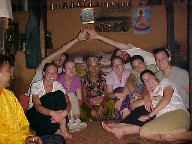WFU students to trek across Nepal for first study abroad program there
 A group of Wake Forest University students will spend the summer in one of the most remote regions in the world through a new program sponsored by the anthropology department.
A group of Wake Forest University students will spend the summer in one of the most remote regions in the world through a new program sponsored by the anthropology department.
For the first time, a Wake Forest class will travel to Nepal in South Asia to learn about the religious and cultural diversity of the small nation’s people. Steven Folmar, visiting assistant professor of anthropology, will lead the program called SPIN for Summer Program in Nepal.
Folmar said Nepal is an ideal location for an intensive cultural study because of its diversity. For centuries, Nepal has been greatly influenced by its Chinese neighbors to the north and Indian neighbors to the south.
The students will earn academic credit as they explore various cultural traditions through activities like yoga lessons in an ashram and worship with Tibetan Buddhist monks. They will also hike in the Himalayas, take language lessons, tour historic and religious sites, and conduct field projects.
“I consider Nepal a feast for all the senses,” Folmar said. “You have the striking Himalayas, hillsides terraced extensively to allow wet-rice farming in the foothills and Kathmandu lined with literally thousands of temples. Even the smells are different. You cannot go to a place like Nepal and emerge unchanged.”
Folmar spent 17 months in Nepal in 1979-80 doing research for his doctoral degree. He returned there with his family in 1991 for three months. On that trip, he found that while some areas had been changed by modernization efforts in South Asia, most were only indirectly affected. But, he said, one constant was the strong unified spirit of the Nepalese, a people who struggled until 1991 with constant political interference from Great Britain, China and India.
“Despite being extremely poor, the Nepalese are accepting, upbeat and resourceful,” Folmar said. “But, at the same time, they have many needs. Their world view is so different from our own, and I wanted Wake Forest students to experience it.”
Christine Bischoff, a 2000 Wake Forest graduate, will also lead the group. She earned bachelor degrees in anthropology and health and exercise science.
SPIN begins July 4. The trek starts with two days of flights from Los Angeles to Tokyo, and from Bangkok to Kathmandu, Nepal’s capital city. There, the group will spend eight days living with local families. Much of that time will be devoted to trips to historical and culture sites, and to language lessons.
The group will then move on to Pokhara to stay with local families for two weeks. The journey continues with a two-night stay in a remote village called Ghachok.
Finally, possibly the most exciting part of the program will happen – a trek toward the Annapurna Himalayas that takes four days each way.
“The Himalayas are the highest and most famous mountains in the world,” Folmar said. “From north to south there is a more than 28,000-foot difference in elevation, in a span of less than 150 miles.”
The students will then return to Kathmandu for two days. Retracing their flight path backwards, the group will arrive back in the United States on Aug. 11.
Special preparations for the program include a long series of inoculations. The students will pack lightly, carrying only essentials like first aid kits and clothing appropriate for strenuous travel.
Through Wake Forest’s International Studies Department, students travel all over the world to earn academic credit. Thirty-seven percent of undergraduate students study abroad during their time at Wake Forest. Several other programs will be offered for this summer including trips to Africa, Cuba, Honduras, Israel and across Europe.
Categories: Awards & Recognition, Experiential Learning, University Announcements
Media Contact
Wake Forest News
media@wfu.edu
336.758.5237



